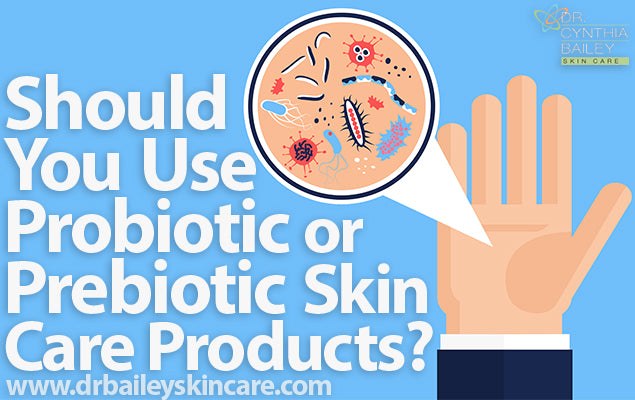Should You Use Probiotic or Prebiotic Skin Care Products?

Should you use the probiotic and prebiotic skin care products that are trending. You're starting to see more and more advertisements for them. What are they all about? Are they ready for 'prime time' and do we know enough about the skin microbiome to credibly recommend these products? I'm not so sure
Dermatologist gives insights on the microbiome of your skin
Should you be using probiotics or prebiotic skin care products? No, not yet. We don’t know enough and the subject is more complicated than it may seem. We are starting to see skin care companies and supplement companies rush to ride the buzz with sales – but wait. Understanding the skin microbiome is still in the early days and NO ONE knows enough to reach conclusions.
The microbiome of your skin is diverse and complex, impacts your skin’s health and your body’s overall health
The microbes on your skin interact; they vary on different parts of your skin (face, fold, dry area, oily area, etc.); they play a role in skin immunity; and they can help or hurt your skin health. Just exactly how this works though is an actively evolving area of scientific research.
We don’t know enough to say which skin microbes are helpful or harmful, what the optimal population diversity should be where and when on your skin. It’s too early to try to ‘curate’ your skin’s microbiome with probiotic or prebiotic (products that help some microbes to grow). I recommend you wait. If it is an interesting topic to you, listen, but don’t reach conclusions yet. It’s early days.
Many people with skin problems, such as rosacea, eczema or acne, are eager for knowledge about probiotics and prebiotics to help their complexions.
The skin microbiome seems like a logical place for answers. We know that having some level of microbial diversity is important to having healthy skin that’s free from skin problems. We don’t know exactly what that means yet. Studies also show that your skin’s microbiome also impacts your entire body’s physiology.
Did you know that your skin’s surface area, when you include the surface of every pore is 30 square meters, which is about 320 square feet?
That’s huge! To put it in perspective, the first home I owned was a 420 square foot condominium in New Orleans - it was a small condo, but for your skin, it’s huge! And, every bit of your 320 square feet of skin is covered by your cutaneous microbiome - for better or worse. What we do and how we do it to create an optimal skin microbiome is unclear. The bottom line is that it is still too early to know what to do. Companies claiming otherwise in an attempt to sell you products are capitalizing on questions, not answers.
What am I, as a dermatologist recommending to help you support a healthy skin microbiome?
Skin care that supports skin health.
Take good care of your skin with moisturizing and not overly drying out skin by harsh cleansing. It matters to your skin’s microbiome. We also know that it matters to your overall physiology, immune function and optimal health. Skin health or problems don’t have just superficial consequences. I recommend that we avoid cleansers that have broad antimicrobial ingredients such as triclosan and benzalkonium chloride. Use gentle cleansers and hypoallergenic moisturizers to protect skin and enhance a healthy skin barrier function. Address skin problems specifically with products aimed to correct the aspects of the problem that we do understand, be it acne, rosacea, seborrhea, skin infection etc. Protect skin from UV rays because UV exposure is immune-suppressive to the skin and also causes degradation and weakening of skin structure.
Keep your overall physiology healthy:
- Eat a veggie heavy diet, low glycemic and moderate to low fat diet. If you have acne, consider limiting mammalian dairy products too. (it impacts your skin microbiome).
- Get regular exercise.
- Spend time in nature (It’s good for your psyche but now we know that vegetation actually impacts your skin’s microbiome – yes, the plot thickens!).
- Moderate stress and get a good night’s sleep.
These are well accepted lifestyle recommendations to keep your immune system healthy and a healthy immune system will support a healthy skin microbiome.
References:
Gallo RL, Human Skin Is the Largest Epithelian Surface for Interactin with Microbes, J Invest Derm. 2017 Jun; 137 (6): 1213-1214
Salem I, et al., The Gut Microbiome as a Major Regulator of the Gut-Skin Axis, Front Microbiol. 2018; 9: 1459
Moestrup KS et al., Dietary Control of Skin Lipid Composition and Microbiome, J Invest Dermatol. 2018 May;138(5):1225-8.
Prescott SL et al., The skin microbiome: impact of modern environments on skin ecology, barrier integrity and systemic immune programming, World Allergy Organ J., 2017 Aug 22;10(1):29
Clark AK, et al., Edible Plants and Their Influence of the Gut Microbiome and Acne, Int J Mol Sci. 2017 May; 18(5): 1070
